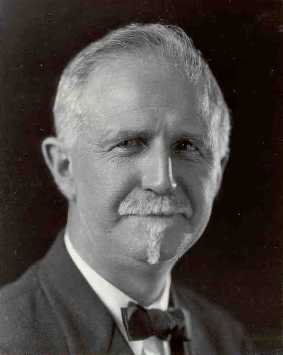Convening in a gilded ballroom in Chicago’s famous Hotel La Salle, more than 400 cheering delegates from thirty-two states enthusiastically nominated nationally-recognized economist Roger W. Babson of Massachusetts for the presidency on this day in 1940.
The 65-year-old Babson, who was nominated without opposition, was joined on the Prohibition Party ticket by little-known Edgar V. Moorman, a wealthy livestock food manufacturer from Quincy, Illinois.
The white-haired statistician — the only major economist in the country to accurately predict the 1929 stock market crash and whose weekly syndicated column was published in 452 newspapers and trade journals throughout the country — was arguably the most widely-known presidential candidate the Prohibitionists had ever nominated.
 News of Babson’s nomination was covered extensively in the nation’s newspapers. “The Prohibition Party is not dead yet,” opined an Ohio newspaper. “It must have life left in it if Roger Babson, the veteran business statistician, takes it up.”
News of Babson’s nomination was covered extensively in the nation’s newspapers. “The Prohibition Party is not dead yet,” opined an Ohio newspaper. “It must have life left in it if Roger Babson, the veteran business statistician, takes it up.”
Declaring that he was joining the Prohibition Party “to help save the nation,” the millionaire economist and financial consultant — a lifelong Republican — had formally aligned himself with the nation’s oldest minor party during the party’s seventieth anniversary celebration in Chicago on September 2, 1939.
A lean, perceptive and deep-thinking individual, the MIT-educated economist — a vigorous defender of the free-market system who had rubbed shoulders with every President from Theodore Roosevelt to Franklin D. Roosevelt, meeting with several of them in and out of the White House and carrying on a regular correspondence with almost all of them — believed that he would poll more than a million votes in the 1940 presidential election.
“I hope that we may obtain a million votes,” he told the Christian Science Monitor a few weeks before the party’s national convention in Chicago. “This will be enough to demonstrate to one, or possibly both, of the major parties that the nation demands more attention to the spiritual values, more honesty, more righteous leadership, more attention to the virtues, more placing of principle above expediency.”
“We will make an issue of it,” concluded Babson, adding that unless one of the older parties offered such leadership, “there will inevitably arise a third party more powerful than all the rest,” a party reminiscent of the Republicans and their phoenix-like rise from the ashes of the dying Whig and Know-Nothing parties in the 1850s.
Babson turned out to be a much better economic forecaster than political prognosticator, garnering only 58,725 votes — about half of the 116,514 votes cast for the Socialist Party’s Norman M. Thomas — while finishing a distant fourth nationally.



Follow Us